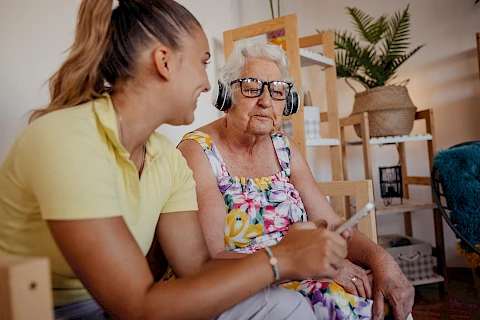
Parkinson's disease presents a unique set of challenges for seniors and their caregivers. It requires a comprehensive and compassionate approach to care that addresses both the physical and emotional aspects of this progressive condition. As caregivers, exploring new methods to aid our loved ones can be rewarding but also challenging. One such innovative approach is music therapy, a therapeutic technique that harnesses the power of rhythm and melody to manage Parkinson's symptoms.
The question on the minds of many caregivers, however, is how to introduce the concept to their senior relatives living with Parkinson's. Convincing them to give this new form of therapy a try may seem like a difficult task. That's why we're here: to give you tips for sensitively discussing the idea and presenting its benefits in a way that appeals to seniors.
Understanding Music Therapy for Parkinson's
Music therapy involves music's innate properties to promote healing and enhance quality of life. For individuals with Parkinson's, music therapy can help manage the symptoms and challenges associated with the disease. From creating a soothing environment that reduces anxiety to aiding in the improvement of motor skills via rhythmic stimulation, music therapy offers a host of benefits.
Preparing to Discuss Music Therapy with Your Senior Relative
Before initiating a conversation about music therapy, it's important to approach the topic with sensitivity. Remember, the aim is to enrich the life of your loved one, not enforce a new regimen. It's vital to understand your senior relative's current perceptions of this therapy. Knowing their music preferences, openness to new methods, and willingness to try non-traditional therapies is key to laying the groundwork.
When discussing the benefits of music therapy, present the information in a way that resonates with your senior relative. Explain how it can help manage Parkinson's symptoms in a non-invasive, enjoyable way.
Initiating the Conversation about Music Therapy
When it's time to bring up the actual conversation, choose a calm, familiar setting where your loved one feels comfortable. Start by expressing your concerns for their well-being and your desire to explore all available options for their care. Introduce music therapy by highlighting its advantages, particularly those that you believe would specifically benefit your senior relative.
If they show resistance, listen to their concerns. Reassure them that the suggestion comes from a place of love and care. Validate their feelings and gently provide counterpoints, focusing on the positive aspects of music therapy.
Following Up After the Conversation
If your senior relative is receptive to trying music therapy, express gratitude for their openness. Look into arranging a trial session, either through a professional music therapy organization or doing simple activities at home.
On the other hand, if your relative is resistant, don't press the issue. Give them time to process the information and revisit the discussion later, perhaps providing new insights or examples of the therapy's effectiveness.
We're Here to Help
Parkinson's disease is a challenging journey, but innovative therapies like music therapy can make a significant difference in managing its symptoms. Senior Helpers, with its specialized Parkinson's care services, stands by caregivers and their senior relatives, ready to assist every step of the way.
If you're a caregiver in Milford, Franklin, Stoughton, Webster, or Sharon and interested in learning more about music therapy and how Senior Helpers Milford-Franklin can aid your journey, contact us today. Your loved ones' well-being is our priority, and we're passionate about finding the best care solutions for them.